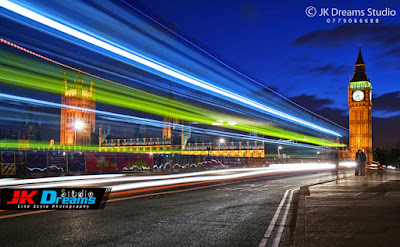Take Your Night Photography to the Next Level
Capturing Street Life
One of the most interesting effects you can capture at night is movement, shown through the figures of people moving and cars and buses driving past. To capture light trails successfully, use a tripod to keep them straight and the background sharp. Turn the mode dial to M (Manual) mode and use a small aperture between (f/11-f/32) for a greater depth of field. Set your ISO at 100 to keep the digital noise at a minimum. The image of the Houses of Parliament required a 6 second shutter speed, which is slow enough to capture the traffic trails. The f/9 aperture allowed the building in the background to be sharp. The more you practice the more you will become tuned to the exposure you need for the effect you want.
Recommended Settings
Night photography is a challenge, and quite often experimentation is the key to success. It is possible to handhold a camera and still shoot at night but this may require a wider aperture, a higher ISO rating and some flash so that the images don’t become blurry. You are usually working with shutter speeds of 1/15th of a second or slower. If you use a tripod then you can afford to use AV (aperture priority) mode and let the camera choose the shutter speed.
Recommended Equipment
Because cityscapes are a type of landscape, a wide-angle lens is very useful. It gives a panoramic effect and requires less light than a telephoto lens. A tripod is required when shooting in low-light in order to avoid camera shake. Tripods allow you to have longer shutter times and therefore avoid using flash, which can look unnatural and harsh in night photographs. Flash is useful however, in night time portrait photography. Cable release and shutter remotes are useful to avoid touching the camera during a long exposure. You can also use special filters at night, such as a star filter that makes lights look like they are small stars.
Conclusion
Photographing cityscapes at night can be challenging and you should expect to be outdoors for some time, experimenting with shutter speeds and effects. Remember that you have to be patient when using slow shutter speeds. The results aren’t always predictable because the majority of the lighting is artificial and at times not stationary. Unpredictability is part of the fun of creativity.
Copy - www.exposureguide.com

